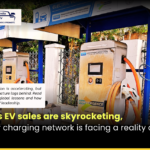
India’s Electric Dream: A Ticking Time Bomb of Battery Waste
As India accelerates its transition to electric vehicles (EVs), a pressing concern looms large: the looming crisis of battery waste. The nation’s ambitious target of 30% EV sales by 2030, coupled with its focus on renewable energy, is driving rapid growth in the EV market. However, this surge in EV adoption is simultaneously creating a significant challenge: the disposal of lithium-ion batteries, which are crucial components of these vehicles.
A Growing Challenge
India’s reliance on imported lithium-ion batteries, primarily from China, highlights the importance of establishing a robust domestic battery manufacturing industry. While the government has introduced various incentives, including the Production Linked Incentive (PLI) scheme, to boost local production, the sector is still in its nascent stages.
As the number of EVs on Indian roads increases, so too does the volume of spent batteries. These batteries, if not disposed of properly, can release toxic chemicals into the environment, posing serious health and ecological risks. The Battery Waste Management Rules of 2022 mandate producers to take responsibility for the collection, recycling, and refurbishment of waste batteries. However, the implementation of these rules and the development of a robust recycling infrastructure remain significant challenges.
The Role of Recycling
Recycling lithium-ion batteries is a complex process that requires specialized technology and expertise. Fortunately, India has a growing number of companies and research institutions working on battery recycling solutions. Companies like LICO Materials are actively collecting and recycling batteries from major EV manufacturers. Additionally, institutions like the Indian Institute of Technology, Madras, are developing innovative recycling technologies to recover valuable materials from spent batteries.
The Road Ahead
While India has made significant strides in its EV journey, addressing the issue of battery waste is crucial to ensure a sustainable future. To achieve this, several key steps are necessary:
- Strengthening the Recycling Infrastructure: Investing in advanced recycling technologies and building a robust network of recycling facilities is essential.
- Enforcing Strict Regulations: Strict enforcement of battery waste management rules is crucial to ensure compliance by manufacturers and importers.
- Promoting Research and Development: Continued research and development in battery recycling technologies can help improve efficiency and reduce costs.
- Incentivizing Recycling: Government incentives, such as tax breaks and subsidies, can encourage investment in battery recycling.
- Consumer Awareness: Raising awareness among consumers about the importance of proper battery disposal and recycling is essential.
By taking proactive measures to address battery waste, India can not only ensure a sustainable EV future but also position itself as a global leader in battery recycling. The challenge is significant, but with concerted efforts from the government, industry, and academia, India can turn this challenge into an opportunity.









